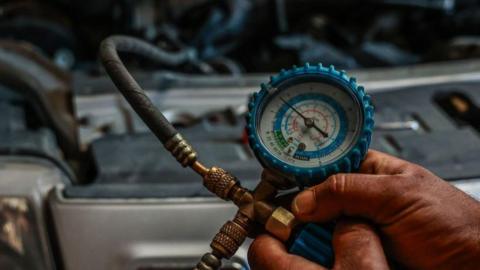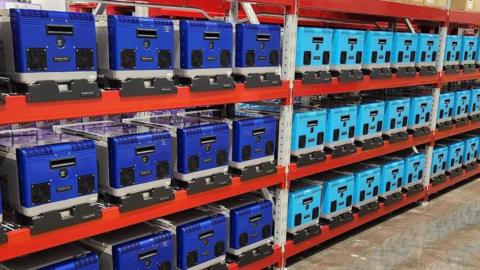In the longer term, some scientists are looking toward cooling devices that don't need liquid refrigerants at all.
Lindsay Rasmussen, who manages building and land-use projects at the energy non-profit RMI, calls these "revolutionary technologies".
A major set of revolutionary cooling tech is solid-state cooling. This uses solid materials and some sort of additional force to induce temperature changes. That extra force could be pressure, voltage, magnets or mechanical stress.
Ms Rasmussen says that solid-state devices can go further than incremental improvements because "not only do they eliminate those super-polluting refrigerants, but they can also offer improved efficiency to the systems".
RMI has identified between 10 and 20 start-ups working on early versions of solid-state cooling devices.
One of those startups is the German company Magnotherm, which uses magnets. Certain materials change temperature when exposed to magnetic fields.
"With our technology, it's inherently safe because it's not toxic, it's a metal, and we operate at very low pressures," according to Timur Sirman, the CEO and cofounder of Magnotherm.
The idea of magnetocaloric cooling has been around for years, but commercialising it is relatively new. Magnotherm has built about 40 beverage coolers, and about five refrigerators, in what is so far a manual and in-house process.
The permanent magnets are the most expensive part of the technology, Mr Sirman reports. "But it never breaks, so we can always reuse this quite cost-intensive component."
The company is seeking out alternative sources of magnetic fields, as well as optimising materials, as they aim to dramatically increase the cooling capacity of their devices.
Mr Sirman believes that if you account for the efficiency and health issues of refrigerants, like leakages, Magnotherm products can compete on price. "We are not targeting customers who are only looking at initial cost."
He acknowledges that for now the company's beverage coolers are quite pricey. Their customers tend to be early adopters of new technologies.



